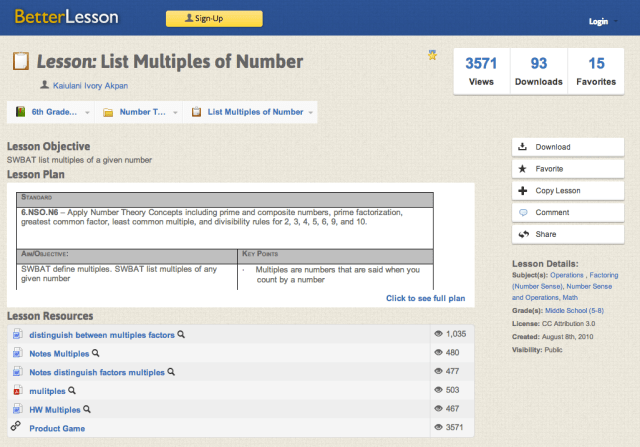As the influence of technology grows in education, many have started to predict the coming obsolescence of classroom fixtures like textbooks, chalkboards, standardized testing — and even teachers. While technology will no doubt transform and replace some familiar pieces of education (for the better), the ideal outcome is not one in which teachers are replaced or marginalized, but one that empowers them and allows them to do their jobs more effectively. Great teachers, as anyone lucky enough to learn from one will attest, can leave lasting impressions and are essential to positive educational outcomes. After all, technology doesn’t teach. Teachers do.
The problem, however, is that technology has yet to unlock the essence of what makes these great teachers great. This is a problem BetterLesson wants to help solve by bringing effective teaching online. Founded in 2008, the Boston-based startup is building a platform on which educators can connect and share the best curriculum, allowing them to search for and browse through different types of files, lesson plans, units and courses and network with fellow teachers.
When we first covered BetterLesson last year, the company had just raised $1.6 million in venture funding from Highland Capital, General Catalyst, NewSchools and more, following its success creating a community of tens of thousands of teachers and hundreds of paying customers, like the 112-charter school network, KIPP.
Of course, for entrepreneurs, the downside of raising venture money is that it generally comes with having to give up a share of equity in their business to those investors. This is a particular issue for education startups, which often take a long time to scale, construct workable business models and get revenues to the point of sustainability.
As a result, grants and subsidized growth can be essential to edtech companies, which is why BetterLesson now finds itself in an enviable position, as it recently became the recipient of a non-dilutive $3.5 million grant from the Bill & Melinda Gates Foundation. This brings the startup’s total grant and funding raised to just over $6 million.
The startup will use its new funding to beef up its staff (now at eight) and launch a new, common core-inspired, teacher-to-teacher learning project that aims to help teachers capture and share the best and most effective approaches to classroom management, lesson plans and curriculum.
In a recent blog post, BetterLesson said that it has spent the last few years trying to “crack the nut of curriculum sharing,” and in so doing has come to some important conclusions. Chief of which are the facts that curriculum is truly a critical component of effective teaching (and it must continue to be). However, teaching is more than just “great curriculum.” As a result, the project will focus on the “how” — instructional strategies and classroom management approaches — just as much as it will on curriculum.
What’s more, it’s important for the project’s participants to be actual classroom teachers who are sharing their best practices from the classroom — not “‘gurus’ who have been out of the profession for 25 years.” And because the startup wants it to be a two-way street, the project will also seek to recognize and compensate its “Master Teachers” for taking the time and energy to share what they’ve learned in terms of what works and what doesn’t and how to create the optimal context for learning.
As to how it hopes to create this knowledge database on curriculum and what makes great teaching great:
By sourcing and recruiting the best teachers from around the country; by giving them access to the most capable common core-knowledgeable coaches in the country; by supporting their development of full courses built from the common core up; by capturing their approaches to planning, instruction, and classroom management in the context of these courses; by sharing this with every teacher via the BL site; and by providing the community the tools to discuss, remix, and adapt these resources to meet the needs of their students. Simple, right? Well, probably not. We know it’s ambitious, but it’s powerful, necessary work. And we’re also pretty sure it’s going to be fun.
BetterLesson co-founder Erin Osborn tells us that the project is already underway and is starting off with a focus on Math for grades 6-12.
The less that the educational system relies on testing as its chief form of assessment, the happier and better off both students and teachers will be. In turn, the more learning data that educational analytics tools and classroom software can compile, and the more that sites like BetterLesson (and TeachersPayTeachers) can build a knowledge repository of best practices and effective approaches to teaching and classroom management, the more education (as a whole) benefits.
With better tools and ammunition behind them, teachers are free to focus on personalizing the learning process and finding the best ways to communicate knowledge to individual students. That’s what will lead to Education 2.0 — not robot teachers. Although robot teachers would be interesting …
More on technology empowering teachers in our coverage here.

